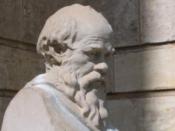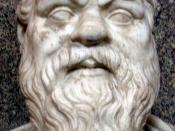Question 1.
In Plato's Apology, Socrates talks about human wisdom and virtue. Compare what Socrates has to say in the Apology with his views on the same topic as expressed in the Crito. Do you find what Socrates has to say compelling? Explain why or why not.
Human Wisdom and Virtue
"The unexamined life is not worth living"(38a). Questioning everything from wisdom to virtue in Plato's dialogs, the Apology and the Crito, establishes Socrates' philosophical views. In the Apology Socrates attempts to give an unapologetic defense against false acquisitions and attempts to go against the people who are condemning him. However, in the Crito Socrates is in his cell waiting for exile and does not want to go against the laws and would rather be put to death than to be unjust. When the dialogs are compared to one another it is easy to see the contradictions between his views of human virtue and wisdom, the impact of this makes Socrates' views less persuasive.
He does, however, set unprecedented opinions that have helped form philosophy and change society.
The Apology is the scene of Socrates' trial were he is defending himself on informal accounts of being a sophist, not believing in the gods of the city, and teaching others his philosophies. Socrates, However, chooses a mode of defenses that ultimately hurts him, for he is mocking the jury and is trying to show them how they are unwise. The condemners had this belief that Socrates had a wisdom that is more than human, which in Socrates' opinion is untrue for he sees himself as being unwise. To illustrate the point on human wisdom Socrates tells the story of the Oracle at Delphi. The Oracle had announced that Socrates was the wisest man and nobody was wiser. Socrates...


